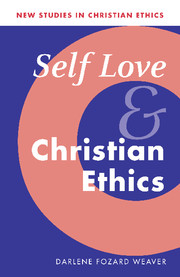General editor's preface
Published online by Cambridge University Press: 12 November 2009
Summary
This book is the twenty-third in the series New Studies in Christian Ethics. It shows extensive points of contact and critical dialogue with other books in the series. Darlene Weaver uses the influential framework provided by Susan Parsons in her Feminism and Christian Ethics for analyzing differing accounts of feminist ethics. She also has significant points in common with Jean Porter's Moral Action and Christian Ethics and with Lisa Cahill's Sex, Gender and Christian Ethics. However it is Stanley Rudman's Concepts of Persons and Christian Ethics and William Schweiker's Responsibility and Christian Ethics that provide her with the most sustained dialogue partners.
Both Darlene Weaver and Stanley Rudman argue that many recent philosophical understandings of selfhood are too limited. Indeed, Weaver suggests that they ‘truncate the self.’ Both authors are convinced that a notion of self-in-relation-to-God offers a much richer account of selfhood and personhood than any secular understanding. For Weaver it is the belief that ‘the person is created to love God’ that is fundamental to this richer account. In the process of arguing this, both authors have kept carefully to the two key aims of the series as a whole – namely to promote monographs in Christian ethics which engage centrally with the present secular moral debate at the highest possible intellectual level and, secondly, to encourage contributors to demonstrate that Christian ethics can make a distinctive contribution to this debate.
- Type
- Chapter
- Information
- Self Love and Christian Ethics , pp. ix - xPublisher: Cambridge University PressPrint publication year: 2002



